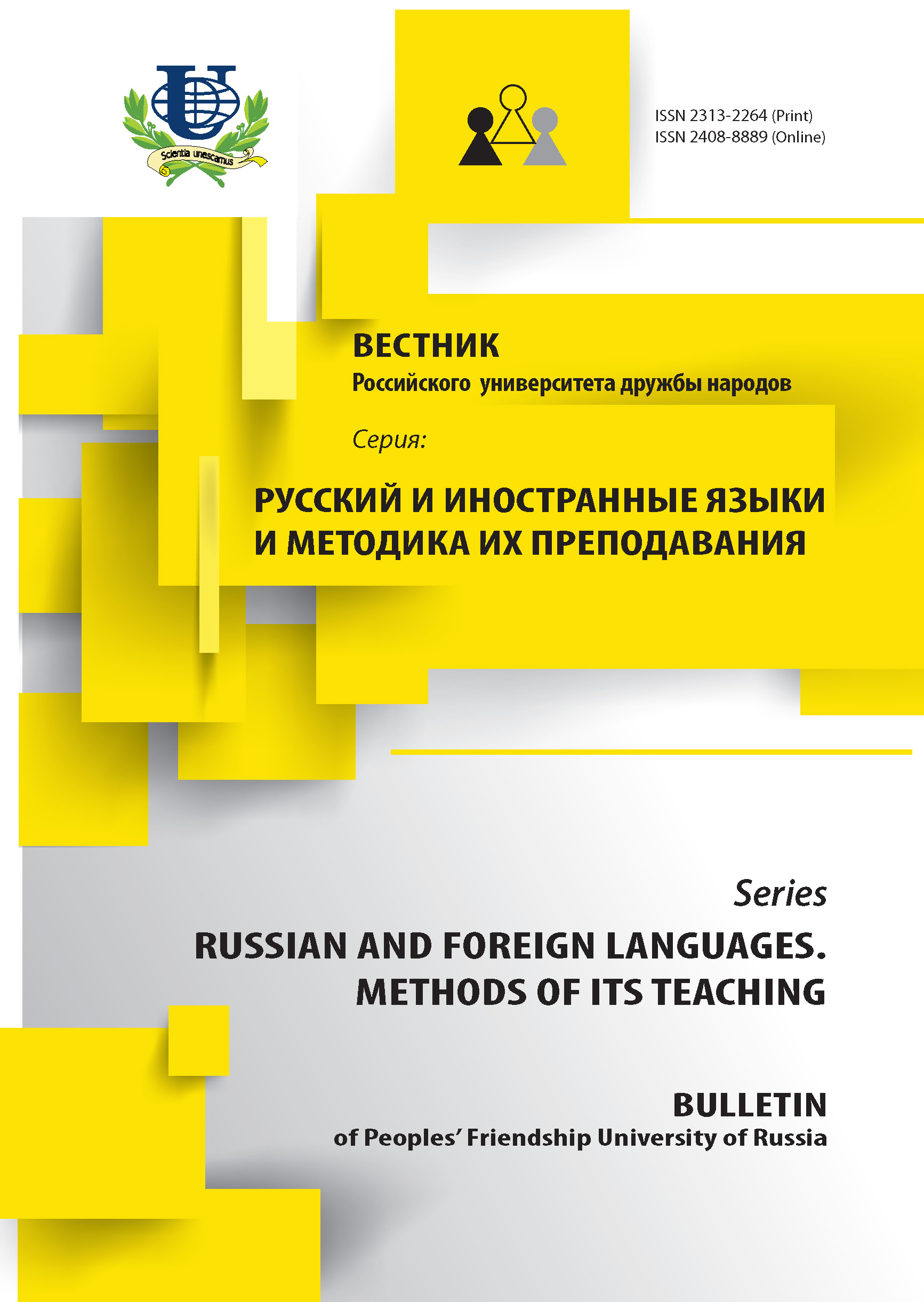No 2 (2014)
- Year: 2014
- Articles: 23
- URL: https://journals.rudn.ru/russian-language-studies/issue/view/618
Articles
 5-9
5-9


Russophones of the Near Abroad: Diagnosis of Changes in the Thesaurus of Linguistic Personality
Abstract
The paper deals with the problem of the Russian language functioning in the post-Soviet area as a mother tongue for russophones - bilingual and polylingual ones, in particular. It reviews the characteristics of their linguistic personality diagnosing preservation of its dominant original identification characteristics under the influence of foreign linguocultural environment and the Russian component decreasing. The author considers such linguistic markers as the increasing number of agnonyms, xenonyms and national-cultural gaps to be the symptoms of marginalization of the Russian linguistic personality that should be considered as a signal to develop appropriate linguodidactic solutions as applied to the formation of the Russian linguistic personality in the near abroad.
Russian Language Studies. 2014;(2):10-15
 10-15
10-15


Natural speech communication in non-linguistic environment
Abstract
The article is devoted to the actual problem of intercultural communication, dialogue of cultures. The idea of the interrelation between culture and language is implemented in practice through innovative educational materials representing anthropocentric educational paradigm. The cultural approach helps to enhance the motivation of foreign language learning in non-linguistic environment. The authors show the importance of dialogue of cultures in the process of selecting educational materials designed to motivate students to communicate, exchange information and emotions. The materials are used to teach Russian to foreigners who do not have the natural language environment for communication.
Russian Language Studies. 2014;(2):16-21
 16-21
16-21


Ethnically Oriented Methods of Teaching Russian as a Foreign language in the Aspect of the Linguistic and Cultural Adaptation (on the Example of Arab Students)
Abstract
This article deals with the problem of implementation the methodical system of linguistic and cultural adaptation in the practice of teaching Russian language to foreign students in Russian universities. The author uncovers the role of ethnically oriented components of methodical system of linguistic and cultural adaptation and examines the possibility of integration ethnically oriented approach with the process of linguistic and cultural adaptation in teaching Russian as a foreign language (on the example of Arab students).
Russian Language Studies. 2014;(2):22-28
 22-28
22-28


Verbal communication skills in lawyer's professional activity
Abstract
Legal language is a semiotic system and an essential part of the legal system, jurisprudence is classified as a linguistically intensive field of studies. Therefore, mastering oral and written speech is an important sign of lawyer's professional qualification. Scientific interest in the problem of teaching lawyers in the sphere of professional communication demonstrates the importance of our research and proves the need in further theoretical and practical research in this sphere.
Russian Language Studies. 2014;(2):29-34
 29-34
29-34


 35-40
35-40


 41-47
41-47


 48-56
48-56


Gesture “touch” in the anomalous communication
Abstract
Priborostroitelnaya str., 35, Orel, Russia, 302034 The article is devoted to the description of anomalous communicative situations, occurring in the tactile communication channel. The language descriptions, characterizing communicators’ tactile behavior, which can lead to communicative anomalies and/or indicate them, are selected and analyzed.
Russian Language Studies. 2014;(2):57-61
 57-61
57-61


 62-66
62-66


 67-71
67-71


 72-79
72-79


Hispanic place names of the U.S. as a means of increasing the motivation of english language classes
Abstract
The article is devoted to the role of the U.S. Hispanic place names in motovating students to learn English. Particular attention is paid to enhancing students' background knowledge by toponymic vocabulary with the emphasis on Spanish place names in the United States.
Russian Language Studies. 2014;(2):80-84
 80-84
80-84


The experience of realization of level higher professional training programs in a foreign ianguage ata technical university
Abstract
The article is devoted to the problems of foreign language training in a technical higher institution arousing in the process of realization of FSES 3-rd generation. The main trends of standards realization in the light of competence approach have been determined in the article. The experience of the Program realization is described; some disadvantages are shown and the ways of training process improvement are suggested. Credit-modular system of training students in higher education is positively characterized in the article. The main trends, mechanisms and procedures of standards realization in the light of competence approach have been determined in the article.
Russian Language Studies. 2014;(2):85-92
 85-92
85-92


Professional foreign language competence of specialists of hotel service
Abstract
Based on the analysis of literature the authors clarify the definitions of professional foreign language competence for specialists in hotel service. The article presents the structure of the competence and criteria determining the level of its development.
Russian Language Studies. 2014;(2):93-100
 93-100
93-100


 101-106
101-106


Teaching pronunciation: experimental data and methodological practices
Abstract
The author focuses on the distinction between palatalized ('soft') and unpalatalized ('hard') consonants as a fundamental characteristic of the Russian consonant system and shows how the experimental data can help us in the teaching Russian pronunciation.
Russian Language Studies. 2014;(2):107-113
 107-113
107-113


Using authentic video at foreign language lessons (the experiment of using a full-length feature film at english lessons in a non-linguistic university)
Abstract
The article deals with an overview of peculiarities characteristic of English lessons at a non-linguistic university which are based on the use of a full-length feature film. In the article there analyzed the theoretical ground for selecting video material, particular experience related to planning and organizing hand-out materials as well as the most efficient exercises and activities associated with the use of feature films in classrooms.
Russian Language Studies. 2014;(2):114-118
 114-118
114-118


Review of Tutorial: Russia yesterday and today: M.: RUDN, 2013
Russian Language Studies. 2014;(2):119-120
 119-120
119-120


Abstract to the Tutorial on Speech Culture, Rhetoric, Official Language, and Intercultural Communication “Technologies of Communicative Leadership”
Russian Language Studies. 2014;(2):121-123
 121-123
121-123


Abstract to the Tutorial on Russian as a foreign language “The Language of Economics and Management: Text Work”
Russian Language Studies. 2014;(2):124-126
 124-126
124-126


 127-133
127-133


Our authors
Russian Language Studies. 2014;(2):134-136
 134-136
134-136















